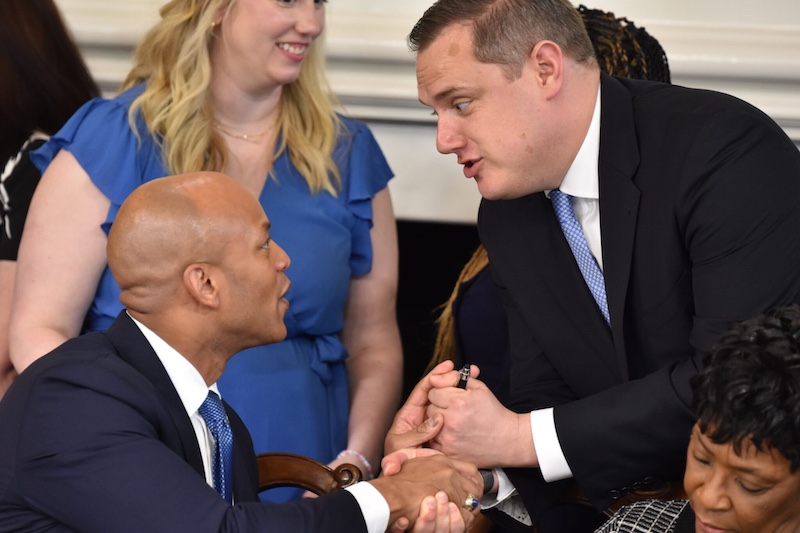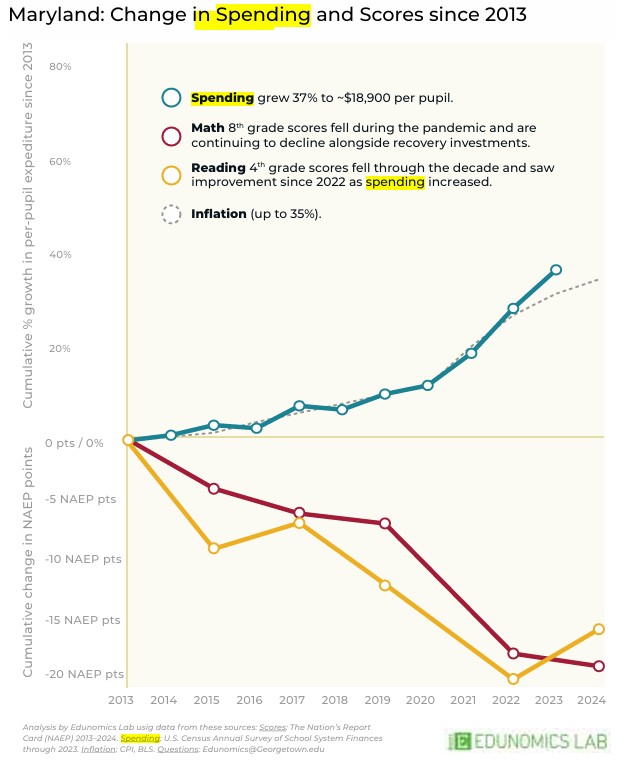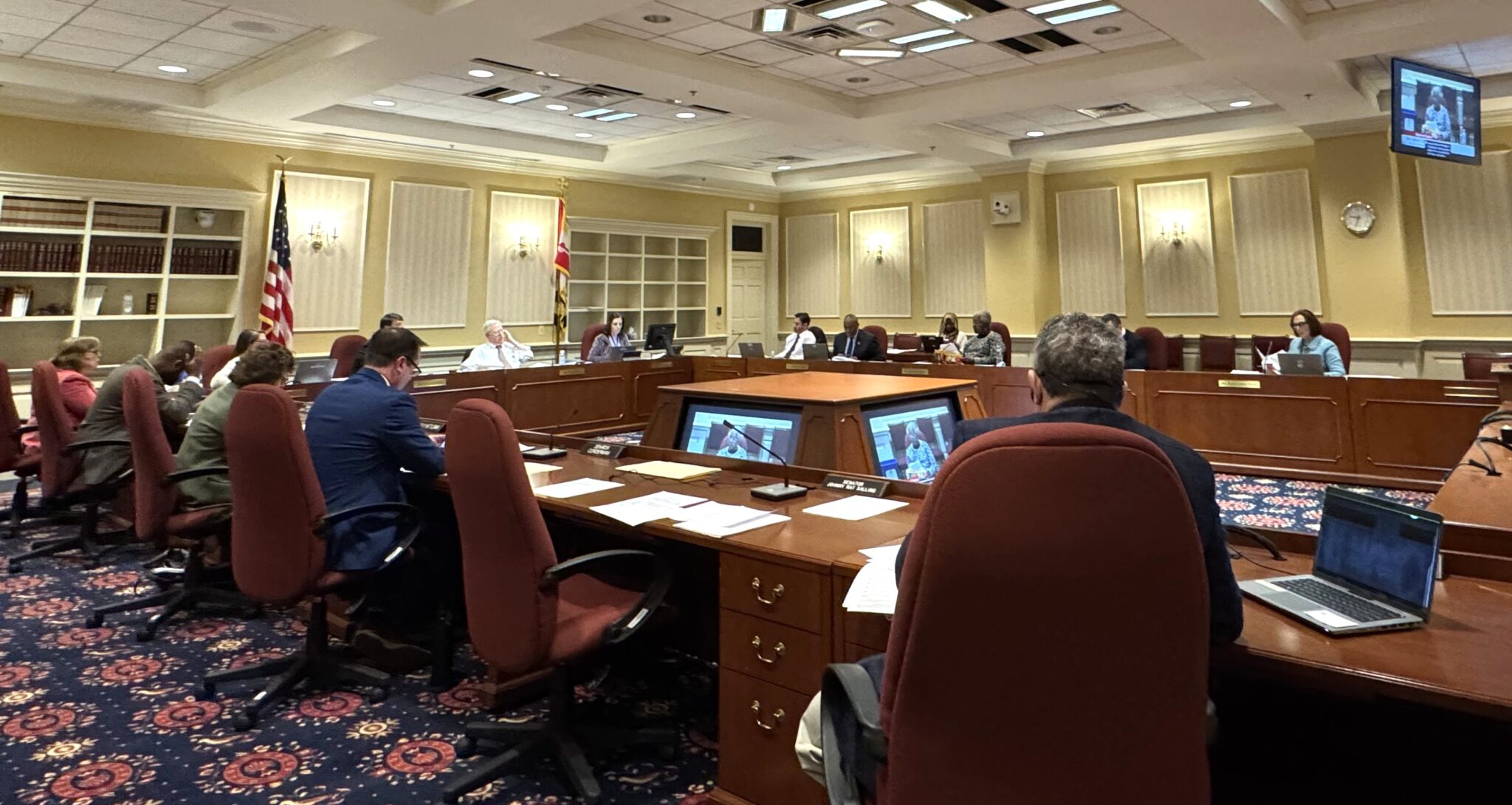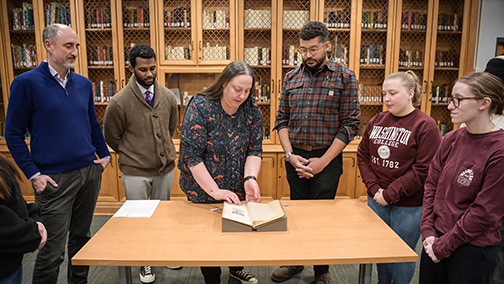Even as changes to the state’s education reform act were being signed into law Tuesday, state officials and advocates were already talking about changes they want to see next in the Blueprint for Maryland’s Future.
The debate over House Bill 504 – the Excellence in Maryland Public Schools Act – was among the sharpest in the 2025 General Assembly session, with the governor and lawmakers, particularly the House, split over changes to the expensive plan that were needed as the state grappled with a $3 billion budget deficit.
But Gov. Wes Moore (D) on Tuesday, standing next to Senate President Bill Ferguson (D-Baltimore City) and House Speaker Adrienne Jones (D-Baltimore County), thanked them, several lawmakers and education officials for their work on the bill, which passed on the last day of the 90-day session last month.
“While this legislation is an important step forward, it cannot be the last step that we take on education,” Moore said at Tuesday’s bill signing ceremony. “While we refine our strategy to ensure we aren’t just spending more, but that we’re spending smart, I will continue to use every option available to me as governor to improve our schools and deliver for our students.”
The final bill did not contain some of the deepest cuts that were offered to try rein in spending on the 10-year, multibillion-dollar Blueprint plan. But it also did not include some of the flexibility for local schools boards that some administrators had been pushing for.
State Board of Education President Joshua Michael, who attended the bill signing ceremony, said the governor and legislature helped to improve the Blueprint plan through their negotiations. But Michael said it would have helped if they had included funding for a teacher coaching program, a recommendation made by a nonprofit’s report last month on reading.
“We’re pleased that the legislature authorized the program, but we need resources,” Michael said. “We’re going to continue to press forward with the tools that we have around the literacy policy and the math policy, and we’re going to work with the legislature and the governor to see what we can do in the future.”
Moore in January proposed a Blueprint reform plan that called for a four-year pause in the expansion of teacher “collaborative time” – hours when teachers are not in the classroom but are planning for meeting. State education leaders have said at least 12,000 new teachers would have to be hired to fully implement collaborative time. The governor also proposed a decrease in funding for special education, low-income and English language learners, and keeping funding for community schools – those that receive concentration of poverty grants – at current levels for two years.
Lawmakers pushed back hard against reductions in funding that would affect those students in most need. Legislators were ultimately able to preserve most of the funding for students in need, and advocates praised lawmakers like Del. Vanessa Atterbeary (D-Howard) for not backing down over funding for underserved students.
Atterbeary, who chairs the House Ways and Means Committee that assesses education policy, said Tuesday the legislature may need to assess education funding in the near future, especially “with the climate” in the federal government led by President Donald Trump (R).
“Why should we say to our most underserved communities, to our minority communities that at the national level when our president is saying, ‘We don’t care about you,’ and WE’RE going to double down and cut their funding. No. Absolutely not,” said Atterbeary, who didn’t attend Tuesday’s ceremony.
“I couldn’t do that as a mother. I couldn’t do that as a woman. I couldn’t do that as an African American and I absolutely couldn’t do it as a legislator,” she said. “Ultimately, the legislation in terms of that aspect passed as we wanted.”
‘Give faith’
Advocates such as Riya Gupta remain pleased the Blueprint bill passed, but she said more money is needed for mental health, behavioral and other wraparound services for students in the upcoming 2025-26 school year.
Under the Consortium on Coordinated Supports, which is part of the Blueprint plan, the governor proposed to fund those services at $130 million for next fiscal year. The House proposed just $40 million, but ultimately Senate language was adopted that allocated $70 million next year and $100 million a year thereafter.
Gupta, interim director for the advocacy group Strong Schools Maryland, which focuses on protecting the Blueprint for Maryland’s Future, said Monday that the state cannot make a habit of analyzing Blueprint funding, as it did this year.
She also said parents, students, advocates and community leaders should be given ample opportunities to become involved in any policy discussions for next year’s legislative session.
“We have to bring them to the table,” she said. “We have to give the faith to listen to their ideas that are also in line with the vision of the Blueprint.”
Sen. Mary Beth Carozza (R-Lower Shore), who voted against the bill last month, agrees more local input is needed. Carozza said she will continue to push for recommendations offered in December by a superintendent’s association.
Several of the association’s proposals became legislation sponsored by Sen. Karen Lewis Young (D-Frederick), and later amendments offered by Carozza, but none of the proposals advanced beyond a Senate committee.
“There were too many missed opportunities to do more on Blueprint revisions and to give our local school systems the flexibility they need…” Carozza said Monday.
Carozza and other Republican lawmakers expressed concerns about future funding for the multibillion-dollar plan, now in its third year. Some have said future budgets will not only affect school systems, but also county governments, which may not be able to pay for increases in transportation, special education or other programs.
Although the Blueprint is funded in the next two years, the subsequent years are slated to shift to the state’s general fund with projected deficits up to $3 billion by fiscal 2030.
“Which translates to new and even bigger taxes,” Carozza said. “We cannot move forward with the Blueprint by doing major cost shifts to the counties.”
by William J. Ford, Maryland Matters
May 7, 2025
Maryland Matters is part of States Newsroom, a nonprofit news network supported by grants and a coalition of donors as a 501c(3) public charity. Maryland Matters maintains editorial independence. Contact Editor Steve Crane for questions: [email protected].










